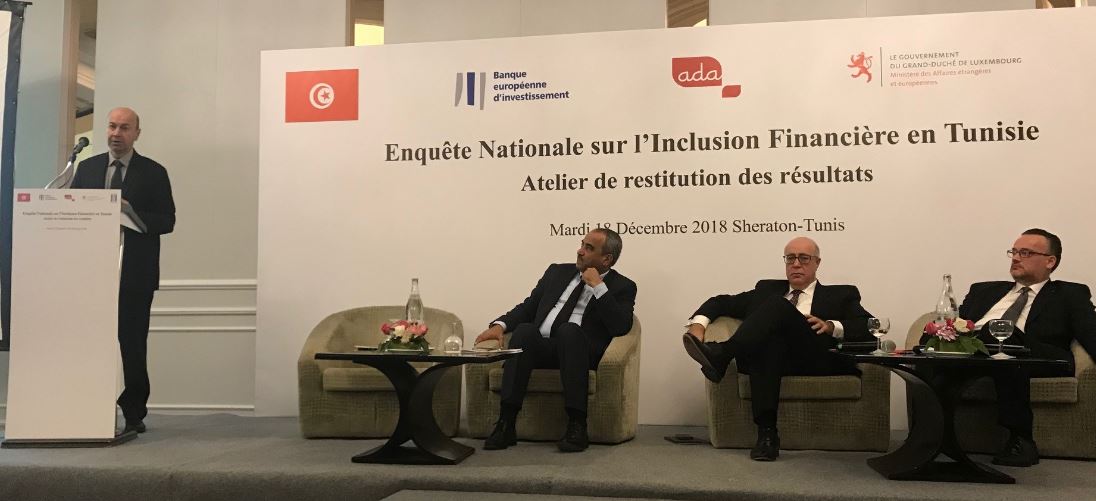MicroMED: Accelerating financial inclusion in Tunisia

MicroMED is a technical assistance project for institutional capacity building in the microfinance sector in Tunisia that took place between 2012 and 2018. It has notably led to the creation of an Observatory of Financial Inclusion (OIF); capacity building of MFIs through the creation of the first microfinance training centre; and the improvement of market infrastructure.
The Tunisian context at the start of the project
After the revolution in Tunisia in 2011, there was an urgent need to revive socio-economic development in the country. Improving access to and use of financial service for the population became a priority. Ending in 2018, the MicroMED project was set up with this aim in mind.
The MicroMED programme was launched in 2012 with a budget of 4 million Euros and was co-financed 50/50 by the FEMIP trust fund (The Facility for Euro-Mediterranean Investment and Partnership) and the Luxembourg Ministry of Foreign and European Affairs and managed by the European Investment Bank (EIB), which delegated the operations out in the field to ADA. The project was designed to provide technical assistance to public authorities and players in the microfinance sector to encourage the growth of employment and financial inclusion in Tunisia, through improving access to financial services for the population and the capacity of MFIs to respond to market need. MicroMED was built around three objectives.
1. Creation of an Observatory for financial inclusion
ADA assisted the Central Bank of Tunisia (CBT) with the creation of an Observatory for Financial inclusion (OFI). Observatory staff were trained in data collection methods, quantitative survey procedures and the use of data processing and communication tools.
In order to provide the Observatory with on-demand data, the OFI received technical support for conducting a national survey on the status of financial inclusion and the use of financial services, the results being used as a basis for recommendations to the authorities for guiding targeted financial inclusion policy (rural women, young entrepreneurs etc.). The results of the study showed that, although financial inclusion within the country was as high as 61%, only 9% were regularly using a bank or postal account. The results of the study were officially presented in December 2018.
Bernard Georges, MicroMED project manager for ADA
"We achieved our objective, it's a real success story ! The infrastructure is solid now, staff are qualified and able to take studies to conclusion and issue recommendations. The Observatory has the skills to launch the next survey all on its own."
Faker Halleb, Director of the Observatory for Financial Inclusion
"Coupled with a qualitative study for understanding the results, the national survey on financial inclusion has enabled us to offer proper qualified recommendations for short- and medium-term implementation. The new organisational and functional structure of the Observatory will enable it to follow up on these recommendations."

Presentation of the results of the national survey in financial inclusion in Tunis on 18 December 2018. From left to right: Bruno Obegi (at the lectern), Adviser to the ADA Board; Ridha Chalghoum, Finance Minister; Marouan El Abassi, Governor of the BCT; Ulrich Brunnhuber, Head of the representative office of the European Investment Bankin Tunis.
Committed to aiding the sector in Tunisia for the period 2019-2021, ADA will continue to support the Observatory, which the Government has tasked with implementing a national financial education programme.
2. Increasing capacity
Following the introduction of a new regulatory framework for microfinance in 2011 and in the wake of the revolution, numerous microfinance institutions (MFIs) were formed from 2014. In order to support this growth and put the sector on a more professional footing, MicroMED assisted with creating the first ever microfinance training centre, which was located within the Académie des Banques et Finances in Tunis, an institution tasked with bank training. A course including 10 basic modules covering the different areas of microfinance was devised around two certifications: one being loan agent and the other management for future heads of MFIs, with 25 qualified trainers from the local area. 496 people, mainly from MFIs and public bodies involved in financial inclusion, have received training to date. As part of another approach, agents from the microfinance Supervisory Authority received training in techniques for auditing information systems within MFIs and procedures for analysing loan portfolio risk.
3. Improving market infrastructure
In order to meet the growing demand for microcredit and to actively promote financial inclusion, a study was conducted to estimate the future refinancing needs of MFIs. A complementary study on the feasibility of a refinancing fund was conducted at the request of the Ministry of Finance, which now has a complete analysis on the subject.
A project designed to follow on from MicroMED will be set up in 2019, enabling us to continue with the analysis and contribute to the creation of a suitable financial structure.
The prospects of the project to support the inclusive finance sector in Tunisia - MicroMED
The good coherence between the objectives of the project, the needs expressed and the priorities identified by the Tunisian side thanks to the new National Strategy for Financial Inclusion 2018-2022, makes it possible to envisage a 2nd phase of the project.
- OFI is actively involved in financial inclusion through the implementation of the financial education programme;
- MFIs will be equipped with social performance standards;
- The ACM is fully playing its role as regulator and wishes to strengthen the control of risks linked to digitalization;
- Continuous training within the ABF is still supported to follow the training needs of MFIs;
- The microfinance degree with ISET, launched in September 2019, will see its first graduates in June 2020;
- The microfinance sector is supported with the creation of a refinancing fund for MFIs.